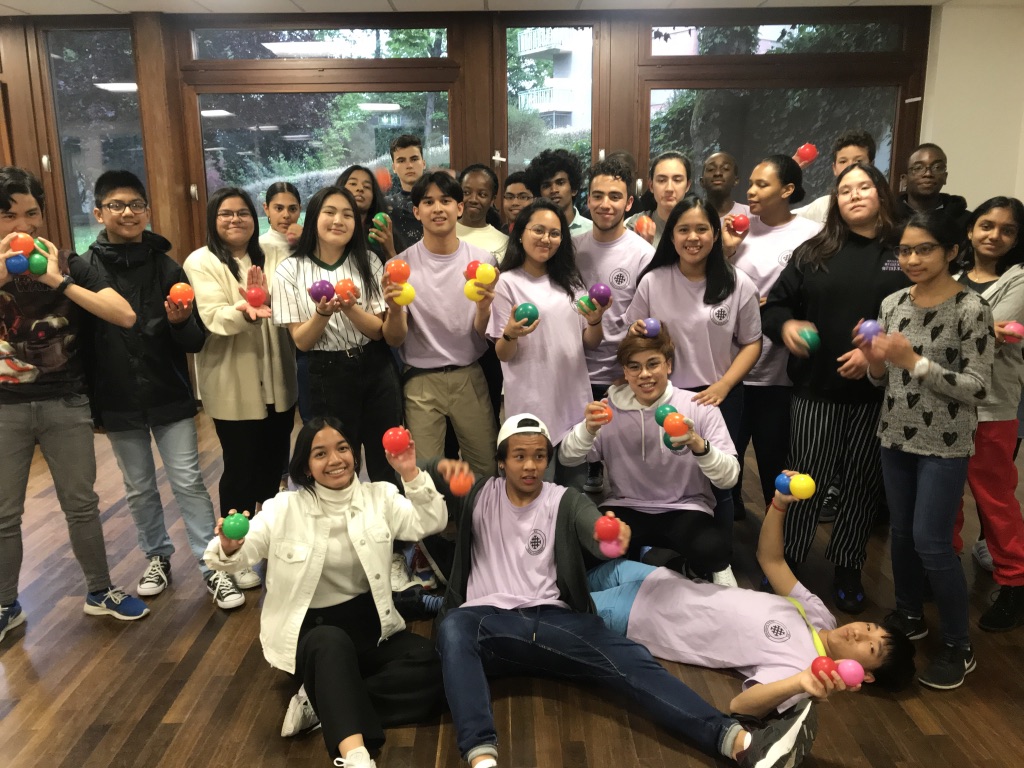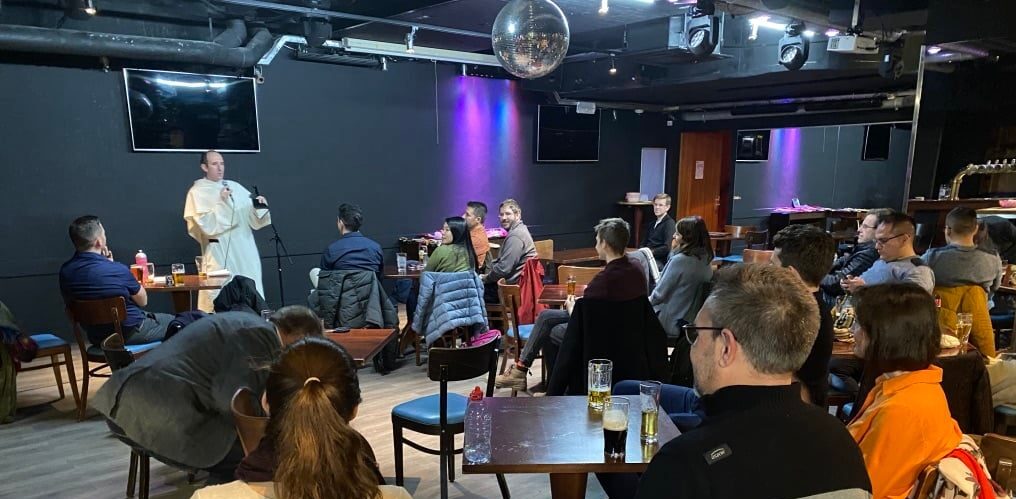The English-speaking parish of St-John XXIII, in Geneva, is a reflection of the international city. Multicultural, lively and dynamic, it is also constantly changing. The faithful of many nationalities are often in search of community ties lost in expatriation.
The building in the rue de Montbrillant seems very deserted and calm on this hot and heavy Friday in June. A misleading image, notes Emily Toole, who receives cath.ch at the entrance to the concrete complex bordered by a vast shaded lawn. Intermittently during the week, the place vibrates with life and joyful bustle. Although the American has not been employed by the parish for a few years, she is still very active in the community as a volunteer.
Universal Church “in miniature”
St-John XXIII was of particular importance for the young woman, who came from Connecticut in 2013. “I arrived here without knowing either the language or the culture. It was a bit difficult. I got closer to the parish, where I very quickly created ties”. New ties that supported her not only morally and spiritually, but also practically. “A small group of faithful organized themselves to take care of my son, when I hadn’t found a place in the crèches,” she recalls with a smile.
Emily’s experience is similar to that of many other St. John’s parishioners. Most of them are what are called “expatriates”, employees of large companies, organizations or international schools present in large numbers in Geneva. Some come from English-speaking countries, others use English as a “language of opportunity”. In particular the Filipinos, who constitute an important part of the faithful. Catholics from Africa, Asia, South America and even Europe make up the nearly 100 nationalities who attend the community. A true universal Church “in miniature”.
Stepfamily”
“The parish is all the richer and more alive,” enthuses Emily Toole. She notes that the colorful summer dress she wears when receiving cath.ch was given to her by an African devotee. “It’s a bit like the image of St. John XXIII, we all have our culture, which we enrich with that of others”. No coincidence then, that the many activities organized by the community are very often related to multiculturalism. In particular, a world cuisine festival took place on Sunday June 19, where parishioners were invited to present the culinary specialties of their country.

John XXIII also owes its dynamism to a very significant participation of the faithful. “We have a model of community which brings together my experiences of the Church in the United States, underlines Emily Toole. That is to say that for people who register, participating in the life of the parish is a kind of evidence. The situation is a little different from the ‘classic’ Swiss parishes, where the ties are often more stable but less intense. People arriving here from a distant country indeed find a ‘family’ setting, a community atmosphere that they may have lost in exile”.
A renewal that does not prevent commitment
More than 2,500 families are registered in the parish, reflecting the large English-speaking population in Geneva. No less than five masses are offered over the weekend, and the 600-seat church is always full. Nearly fifty catechists are also available. One or two priests usually serve, from English-speaking countries. Father Paul Friel, from Scotland, is the only one currently officiating.
An important community, therefore, but also constantly changing. The reality of expatriation in Geneva means that families do not stay there for long, even if the faithful have been there for decades. “Every two years, about a third of the parishioners leave,” notes Emily Toole. A continual renewal that in no way prevents personal commitment. “What is extraordinary is that people passing through are keen to leave a mark. For example, a few years ago we welcomed a carpenter. He only stayed two years, but he made the whole stage with his own hands, on which the children played the Passion show. The latter was one of the last flagship events of the community, bringing together nearly 50 actors, children, teenagers and adults.
A united parish
In this fluctuating situation, fixed and perennial activities would not make much sense. Creativity and adaptation are therefore essential and the events, from one year to the next, are never the same. In the 10 years that she has been in Geneva, Emily Toole has provided a great deal of imagination and organization. After working for years within the “family” of Montbrillant as a youth leader, she undertook training as a pastoral agent at the CCRFE. “If the English-speaking parish allowed me to make ties in Switzerland, to get used to this new life more easily, I then felt the need to integrate myself more into the Church in Switzerland”.

A path also followed by his parish, which further links his activities to the Geneva ecclesial fabric. St-John XXIII notably welcomed a hundred people on May 26 for the World Day of the Poor, with the Pastoral Care of Open Environments. “It was an opportunity to meet people in precarious situations. It was a very beautiful moment. Solidarity is an important part of the mission of the parish”.
Theology in the pub
From the start of the pandemic, the community had also launched the “Solidarity Caravan”, providing thousands of meals, but also clothing, bedding and housing options to the most deprived inhabitants of Geneva.
Emily is also organizing the protest with her husband “Theology on Tap” (Theology under pressure). Once a month, priests and lay people are invited to a local pub to give participatory talks over a (draft) beer. From the fall of 2022, the American hopes to be able to give events in French.
Like the great Catholic family, St-John therefore operates on the principle of “unity in diversity”. If the parish boat sails cheerfully on a constantly changing sea, it also wants to anchor permanently in the soil of Geneva (cath.ch/rz).
St John XXIII Parish (St-John) was officially established within the Diocese of Lausanne, Geneva and Friborg (LGF) in 1971. It is a linguistic rather than a territorial parish, made up of over 100 different nationalities who share English as a common language. The origins of the community date back to 1956, when an English-speaking Catholic chaplaincy was established in Geneva. Its mission was to meet the spiritual needs of the growing English-speaking community. Over the years, the community has grown and diversified considerably.
Exchange of churches
The parish was based from October 1982 to February 2013 at the Center Jean XXIII, in Petit-Saconnex. It moved to the Saint-Nicolas de Flüe church, rue de Montbrillant, in March 2013, mainly to respond to the increase in the number of parishioners. The current premises now offer twice as much space for worship, ministries, religious education and community gatherings.
The Saint-Nicolas de Flüe church originally housed the French-speaking parish of the same name. By mutual agreement and with the bishop’s blessing, the two parish communities have agreed to exchange their premises, with the Church of St. Nicholas of Flüe and its adjacent parish house becoming the new “home” of the English-speaking parish of Saint John XXIII in March 2013.
The parish is entirely self-sufficient in terms of funds and staff salaries, with the exception of the priest, who is paid by the Roman Catholic Church of Geneva (ECR). RZ
© Catholic Media Center Cath-Info, 24.06.2022
The rights to all content on this site are registered with Cath-Info. Any distribution of text, sound or image on any medium whatsoever is chargeable. Registration in other databases is prohibited.
English-speaking parish of Geneva: a “family” from all over the world – Swiss Catholic Portal

